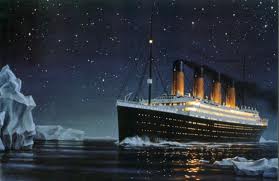 Summer driving season affords an opportunity to listen to music over and over. Knowing how many times I’ve listened to Bob Dylan’s Tempest (2012) as the miles rolled along, would prove embarrassing. My favorite has become the fourteen-minute, 45-verse title-track, Tempest—a ballad about the sinking of the Titanic. (Bob Vander Lugt offered a great review of the entire album in the January/February 2013 Perspectives.)
Summer driving season affords an opportunity to listen to music over and over. Knowing how many times I’ve listened to Bob Dylan’s Tempest (2012) as the miles rolled along, would prove embarrassing. My favorite has become the fourteen-minute, 45-verse title-track, Tempest—a ballad about the sinking of the Titanic. (Bob Vander Lugt offered a great review of the entire album in the January/February 2013 Perspectives.)
One of my road trips was to join a group of teenagers on a summer service trip. As I was extolling the song, one unconvinced teenager asked, “What can be so great about a fourteen-minute song about a hundred year old shipwreck?” Thrown off by his pointed clarity, I stammered, “It’s a parable—an allegory about our world, about ‘modern civilization.’” I didn’t say so at the time, but really it’s an apocalypse, the unthinkable befalling the supposedly unsinkable.
Revelation is purportedly Dylan’s favorite biblical book. If so, it makes sense: staggering imagery, oblique messages, old and new in conflict. About the fortieth verse of Tempest, we hear that the captain of the Titanic “read the book of Revelation, and filled his cup with tears.” The final song of the album, Roll On, John is about a seer who appears to be about three-quarters Lennon of Liverpool, and one-quarter the Revelator of Patmos.
The sinking of an unsinkable ocean liner as an allegory for our civilization—it hardly seems especially observant or original. Recall the Tower of Babel. Musically, Tempest has an old-shoe familiarity—swaying, comfortable, relaxed. It provides an unobtrusive canvas for the artist to fill. And fill it, he does. Dylan’s use of biblical, apocalyptic language infuses power, an epic quality. Consider this
Smokestack was leaning sideways
Heavy feet began to pound
He walked into the whirlwind
Sky splitting all around
The ship was going under
The universe had opened wide
The roll was called up yonder
The angels turned aside
Apparently, the Revelator has an apprentice. Later, we’re told “the veil was torn asunder.” Or how about
The passageway was narrow
There was blackness in the air
He saw every kind of sorrow
Heard voices everywhere.
Before a ballad can be a great parable, it must tell a compelling story. A universal message has to have authenticity and pathos in the particular. Dylan includes characters like Leonardo (Dicaprio?) and his sketch book, Davey the brothel keeper, Mr. Astor, and a host of others. The gamblers “Calvin, Blake, and Wilson,” carry enough surplus meaning to keep Dylan exegetes theorizing into the foreseeable future. Critics have noted the dark tone of the entire album. It’s true. Most characters are grasping and grubby creatures; vile and violent people. Maybe you’ve got to be Reformed to appreciate that.
Not surprisingly, wealth and weapons don’t do you much good when a ship goes down. We hear of “shattered crystal” scattered about, while passengers drown “upon the staircase of brass and polished gold.” One character “straps on both his pistols” only to find neither threats nor companions remain. “In silence there he waited for time and space to intervene.”
I may be too close to the subject matter to fairly interpret this verse.
The bishop left his cabin
To help others there in need
Turned his eyes up to the heavens
Said, “The poor are yours to feed”
Perhaps the bishop’s desire to help is genuine; his supplication to heaven a humble acceptance of his own powerlessness. But it seems more likely a portrayal of a hypocrite refusing responsibility, offering petty piety in its place. Is this Dylan’s evaluation of “organized religion” as the world steams toward ruin?
In contrast, however, is the passenger
who never learned to swim,
saw the little crippled child
and he gave his seat to him.
He saw the starlight shining,
streaming from the East,
death was on the rampage
but his heart was now at peace.
While this sacrificial altruism is admirable and gives him peace in the midst of chaos, dare we hope the “starlight shining, streaming from the East” is the star of Bethlehem, or better yet, the one whose birth the star heralded?
The watchman is a character who reappears several times. Is his occupation suggestive—the seer, perhaps Dylan himself, the poet, the prophet? May I include the preacher too? The debris from Patmos resurfaces.
In his dreams the watchman sees Titanic’s sinking before it happens. But his dreamy sleep keeps him from preventing the actual shipwreck. Even the sinking doesn’t wake him. Instead, in his dreams he tries unsuccessfully to tell others of the impending doom. Hasn’t every preacher and poet and prophet been there? Seeing yet incapable of telling, unable to get other’s attention, so caught up in our dreams no one hears us, powerless to stop the apocalypse.
Finally the focus pulls back from the homey tales. All the particulars give way to the universal.
When the Reaper’s task had ended
Sixteen hundred had gone to rest
The good, the bad, the rich, the poor
The loveliest and the best
They waited at the landing
And they tried to understand
But there is no understanding
the judgment of God’s hand.

